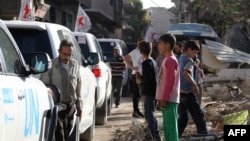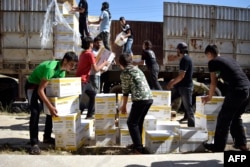U.S. efforts to get badly needed aid from Turkey to Syria are being hampered by the ongoing impasse in negotiations and the Syrian government’s continuing siege on areas held by opposition groups, including those supported by Washington.
Food scarce
As a result, U.S. officials say, nearly 20 towns have been deprived of food and humanitarian shipments, in some cases, for years, and food shortages are intensifying.
It is against this backdrop that the U.S., Britain, and France have issued an urgent call for the United Nations to begin humanitarian airdrops. U.N. officials, however, were quoted as saying airdrops were not imminent.
The call came ahead of a Security Council meeting to talk about the humanitarian crisis.
“France is asking the United Nations, and in particular the WFP, to begin humanitarian airdrops for all the areas in need, beginning with Daraya, Muadhamiya and Madaya, where the civilian population, including children, risks dying of hunger,” France’s U.N. ambassador, Francois Delattre, said at a news conference.
Officials said convoys reached the towns of Daraya for the first time in four years and a second one arrived in Muadhamiya Wednesday.
Some, however, say it is perhaps too little, too late. The U.S. Department of State called the deliveries “far from sufficient.”
The International Syria Support Group, including Russia and the U.S., agreed last month that it would call for airdrops if aid shipments were still being blocked by June 1.
“On the day of that deadline, the Assad regime has cynically allowed limited amounts of aid into Daraya and Muadhamiya, but it has failed to deliver the widespread humanitarian access called for by the international community,” Britain’s foreign secretary, Philip Hammond, said in a statement.
Hammond said that while airdrops are complex, costly, and risky, “they are now the last resort” to relieve suffering in the besieged areas where U.N. officials say more than a half-million people are vulnerable.
Humanitarian aid
U.S. officials say getting American aid from Turkey to Syria has become very difficult as hostilities have continued and they are calling for third country actors in the Syrian conflict to use their leverage to make the aid deliveries possible.
“Without pressure from Russia and Iran, and some other countries to push the regime in Damascus to provide humanitarian access to almost 20 besieged towns where people have not received food or humanitarian aid in some cases for years, I don’t succeed,” said Mark Ward, director of the Syria Transition Assistance Response Team at the U.S. embassy in Ankara.
Ward’s team is responsible for coordinating all U.S. assistance that is channeled to Syria via Turkey.
“If the humanitarian situation doesn’t get better and if the cease-fires don’t work and if the hostilities continue, there will not be a political process because the environment has to be conducive to support the opposition and the Syrian people are not going to support the opposition in a political dialogue with the regime when they see no humanitarian access and increasing hostilities,” Ward told VOA.
U.S. officials say getting both humanitarian aid to meet people’s basic needs and stabilization aid to get infrastructure running again have been impeded, not only by the Islamic State group’s continued hold on territory, but by Turkey’s moves to seal its border with Syria, as conditions have deteriorated in southeastern Turkey.














